扬大英国文学史 诗歌翻译
莎士比亚十四行诗精选译文
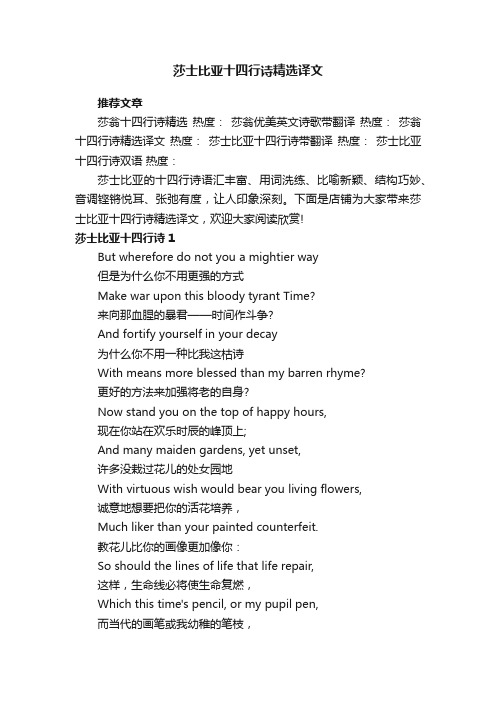
莎士比亚十四行诗精选译文推荐文章莎翁十四行诗精选热度:莎翁优美英文诗歌带翻译热度:莎翁十四行诗精选译文热度:莎士比亚十四行诗带翻译热度:莎士比亚十四行诗双语热度:莎士比亚的十四行诗语汇丰富、用词洗练、比喻新颖、结构巧妙、音调铿锵悦耳、张弛有度,让人印象深刻。
下面是店铺为大家带来莎士比亚十四行诗精选译文,欢迎大家阅读欣赏!莎士比亚十四行诗1But wherefore do not you a mightier way但是为什么你不用更强的方式Make war upon this bloody tyrant Time?来向那血腥的暴君——时间作斗争?And fortify yourself in your decay为什么你不用一种比我这枯诗With means more blessed than my barren rhyme?更好的方法来加强将老的自身?Now stand you on the top of happy hours,现在你站在欢乐时辰的峰顶上;And many maiden gardens, yet unset,许多没栽过花儿的处女园地With virtuous wish would bear you living flowers,诚意地想要把你的活花培养,Much liker than your painted counterfeit.教花儿比你的画像更加像你:So should the lines of life that life repair,这样,生命线必将使生命复燃,Which this time's pencil, or my pupil pen,而当代的画笔或我幼稚的笔枝,Neither in inward worth nor outward fair不论画外表的美或内心的善,Can make you live yourself in eyes of men.都没法使你本身在人眼中不死。
《英国文学选读》浪漫主义诗歌名家译文[1]
![《英国文学选读》浪漫主义诗歌名家译文[1]](https://img.taocdn.com/s3/m/90ea63583c1ec5da50e270eb.png)
我好似一朵流云独自漫游华兹华斯(英1770——1850)我独自漫游!像山谷上空悠悠飘过的一朵云儿,蓦然举目,我望见一丛金黄色的水仙,缤纷茂密;在湖水之滨,树荫之下,在随风摇弋,舞姿潇洒。
连绵密布似繁星万点在银河上下闪烁明灭,这一片水仙,沿着湖湾排成延续无尽的行列;一眼便瞥见万朵千株,摇颤着花冠,轻盈飘舞。
湖面的涟漪也迎风起舞,水仙的欢悦却胜似涟漪;有了这样愉快的伴侣,诗人怎能不心旷神怡!我凝望多时,却未曾想到这美景给了我怎样的珍奇。
从此,每当我倚榻而卧,或情怀抑郁,或心境茫然,水仙呵,便在心目中闪烁——那是我孤寂时分的乐园;我的心灵便欢情洋溢,和水仙一道舞蹈不息。
希腊古瓮颂你委身“寂静”的、完美的处子,受过了“沉默”和“悠久”的抚育,呵,田园的史家,你竟能铺叙一个如花的故事,比诗还瑰丽:在你的形体上,岂非缭绕着古老的传说,以绿叶为其边缘;讲着人,或神,敦陂或阿卡狄?呵,是怎样的人,或神!在舞乐前多热烈的追求!少女怎样地逃躲!怎样的风笛和鼓谣!怎样的狂喜!听见的乐声虽好,但若听不见却更美;所以,吹吧,柔情的风笛;不是奏给耳朵听,而是更甜,它给灵魂奏出无声的乐曲;树下的美少年呵,你无法中断你的歌,那树木也落不了叶子;卤莽的恋人,你永远、永远吻不上,虽然够接近了--但不必心酸;她不会老,虽然你不能如愿以偿,你将永远爱下去,她也永远秀丽!呵,幸福的树木!你的枝叶不会剥落,从不曾离开春天;幸福的吹笛人也不会停歇,他的歌曲永远是那么新鲜;呵,更为幸福的、幸福的爱!永远热烈,正等待情人宴飨,永远热情地心跳,永远年轻;幸福的是这一切超凡的情态:它不会使心灵餍足和悲伤,没有炽热的头脑,焦渴的嘴唇。
这些人是谁呵,都去赶祭祀?这作牺牲的小牛,对天鸣叫,你要牵它到哪儿,神秘的祭司?花环缀满着它光滑的身腰。
是从哪个傍河傍海的小镇,或哪个静静的堡寨山村,来了这些人,在这敬神的清早?呵,小镇,你的街道永远恬静;再也不可能回来一个灵魂告诉人你何以是这么寂寥。
英国名家诗歌译文
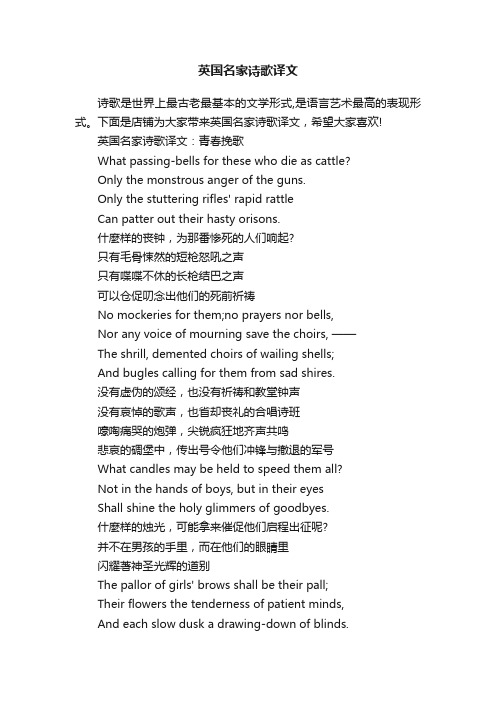
英国名家诗歌译文诗歌是世界上最古老最基本的文学形式,是语言艺术最高的表现形式。
下面是店铺为大家带来英国名家诗歌译文,希望大家喜欢!英国名家诗歌译文:青春挽歌What passing-bells for these who die as cattle?Only the monstrous anger of the guns.Only the stuttering rifles' rapid rattleCan patter out their hasty orisons.什麼样的丧钟,为那番惨死的人们响起?只有毛骨悚然的短枪怒吼之声只有喋喋不休的长枪结巴之声可以仓促叨念出他们的死前祈祷No mockeries for them;no prayers nor bells,Nor any voice of mourning save the choirs, ——The shrill, demented choirs of wailing shells;And bugles calling for them from sad shires.没有虚伪的颂经,也没有祈祷和教堂钟声没有哀悼的歌声,也省却丧礼的合唱诗班嚎啕痛哭的炮弹,尖锐疯狂地齐声共鸣悲哀的碉堡中,传出号令他们冲锋与撤退的军号What candles may be held to speed them all?Not in the hands of boys, but in their eyesShall shine the holy glimmers of goodbyes.什麼样的烛光,可能拿来催促他们启程出征呢?并不在男孩的手里,而在他们的眼睛里闪耀著神圣光辉的道别The pallor of girls' brows shall be their pall;Their flowers the tenderness of patient minds,And each slow dusk a drawing-down of blinds.女孩面容的苍白,将是他们洁白的棺布家人温柔的忍耐,将是他们优美的丧花大后方日日垂暮,下帘吊丧英国名家诗歌译文:闲暇What is this life if, full of care,生活会变成什么样,假如整日充满着忧患We have no time to stand and stare!我们没时间去驻足欣赏No time to stand beneath the boughs, 没时间去站在树枝底下And stare as long as sheep and cows. 像牛羊那样久久的凝视No time to see, when woods we pass, 没时间去细赏我们穿越的大森林Where squirrels hide their nuts in grass. 那松鼠在草丛中把果实珍藏No time to see,in broad daylight,没时间去想一想为什么Streams full of stars,like skies at night. 倒影在溪流中的星星像晴空的夜晚No time to turn at Beauty's glance,没时间去细想那佳人的回眸一瞥And watch her feet,how they can dance. 欣赏那脚舞姿是多么擅长No time to wait till her mouth can无暇等那佳人红唇轻启Enrich that smile her eyes began.盈盈的笑眸更加动人A poor life this if, full of care,生活可悲可厌,倘若它充满着忧患We have no time to stand and stare. 我们没时间去驻足欣赏。
英国文学史课文-十四行诗+给少女的忠告
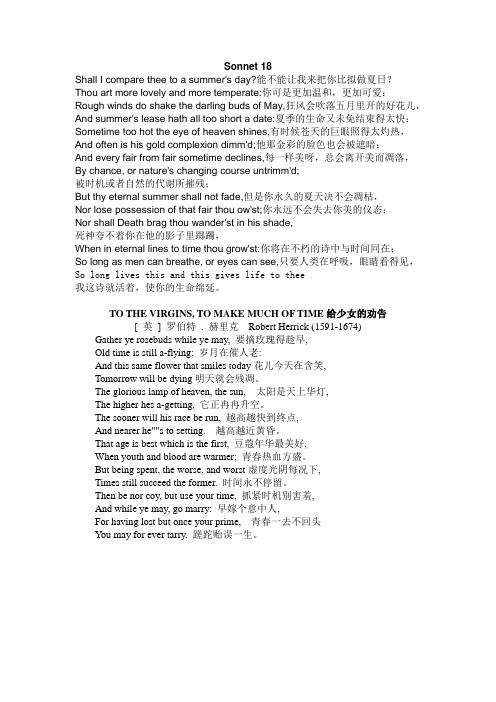
Sonnet 18Shall I compare thee to a summer's day?能不能让我来把你比拟做夏日?Thou art more lovely and more temperate:你可是更加温和,更加可爱:Rough winds do shake the darling buds of May,狂风会吹落五月里开的好花儿,And summer's lease hath all too short a date:夏季的生命又未免结束得太快:Sometime too hot the eye of heaven shines,有时候苍天的巨眼照得太灼热,And often is his gold complexion dimm'd;他那金彩的脸色也会被遮暗;And every fair from fair sometime declines,每一样美呀,总会离开美而凋落,By chance, or nature's changing course untrimm'd;被时机或者自然的代谢所摧残;But thy eternal summer shall not fade,但是你永久的夏天决不会凋枯,Nor lose possession of that fair thou ow'st;你永远不会失去你美的仪态;Nor shall Death brag thou wander'st in his shade,死神夸不着你在他的影子里踯躅,When in eternal lines to time thou grow'st:你将在不朽的诗中与时间同在;So long as men can breathe, or eyes can see,只要人类在呼吸,眼睛看得见,So long lives this and this gives life to thee我这诗就活着,使你的生命绵延。
莎士比亚经典十四行诗英文翻译
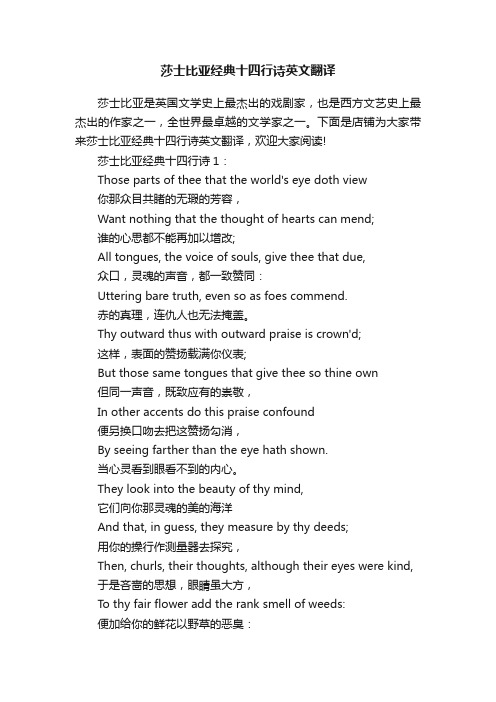
莎士比亚经典十四行诗英文翻译莎士比亚是英国文学史上最杰出的戏剧家,也是西方文艺史上最杰出的作家之一,全世界最卓越的文学家之一。
下面是店铺为大家带来莎士比亚经典十四行诗英文翻译,欢迎大家阅读!莎士比亚经典十四行诗1:Those parts of thee that the world's eye doth view你那众目共睹的无瑕的芳容,Want nothing that the thought of hearts can mend;谁的心思都不能再加以增改;All tongues, the voice of souls, give thee that due,众口,灵魂的声音,都一致赞同:Uttering bare truth, even so as foes commend.赤的真理,连仇人也无法掩盖。
Thy outward thus with outward praise is crown'd;这样,表面的赞扬载满你仪表;But those same tongues that give thee so thine own但同一声音,既致应有的崇敬,In other accents do this praise confound便另换口吻去把这赞扬勾消,By seeing farther than the eye hath shown.当心灵看到眼看不到的内心。
They look into the beauty of thy mind,它们向你那灵魂的美的海洋And that, in guess, they measure by thy deeds;用你的操行作测量器去探究,Then, churls, their thoughts, although their eyes were kind, 于是吝啬的思想,眼睛虽大方,To thy fair flower add the rank smell of weeds:便加给你的鲜花以野草的恶臭:But why thy odour matcheth not thy show,为什么你的香味赶不上外观?The solve is this, that thou dost common grow. 土壤是这样,你自然长得平凡。
英国文学中诗歌翻译

英国文学选读课诗歌中文译文June, 2009威廉·莎士比亚(1564—1616)十四行诗(第十八首)我怎能把你来比作夏天?你不独比它可爱也比它温婉:狂风把五月宠爱的嫩蕊作践,夏天出赁的期限又未免太短:天上的眼睛有时照得太酷烈,它那炳耀的金颜又常遭掩蔽:被机缘或无情的天道所摧折,没有芳艳不终于雕残或销毁。
但你的长夏永远不会雕落,也不会损失你这皎洁的红芳,或死神夸口你在他的影里漂泊,当你在不朽的诗里与时同长。
只要一天有人类,或人有眼睛,这诗将长存,并且赐给你生命(朱生豪译)商籁第十八将君比作夏日兮如之何?君子俊秀谦和兮胜之多。
五月蓓蕾兮难禁狂风之摧折,夏季何短促兮转眼便过。
天之目兮光炎炎而炽烈,其颜如金兮有时亦昏黑;佳人之倩丽兮终将衰减,时运之多变兮有损其颜色,独君之长夏兮无有终止,君之美好兮永葆而不逝,死神亦茫然兮不知君何之。
君托身于诗篇兮将与天时而共存,当人能呼吸兮其目能审,此诗必传兮赋君以永生。
(赵增辉译)威廉·布莱克扫烟囱的小孩白雪里有个黑黑的小东西,“扫烟,扫烟”凄凉地喊叫。
“孩子!你的父母呢?”“他俩都去教堂做祷告,“只因为我在荒野上很欢快,又在冬天的雪地里能欢笑,他们便给我穿上这丧衣,还教我唱这凄凉的曲调。
“又因为我唱歌跳舞很欢畅,他们认为对我不曾有损伤,便去赞颂上帝,牧师和君王,用我们的痛苦建造了一个天堂。
”(赵增辉译)老虎,老虎老虎,老虎,火一样的辉煌,燃烧在那深夜的丛莽。
是什么超凡的手和眼睛塑造出你这可怖的匀称?从何处取得你眼中之火?取自深渊,还是取自天国?凭什么翅膀他有此胆量?凭什么手掌敢攫取这火光?什么样的臂力,什么样的神工把你心脏的筋拧制成功?在什么样可怕的手中你的心脏开始最初的博动?什么样的铁锤?什么样的铁链?什么样的熔炉把你的脑子烧练?什么样的握力?什么样的铁砧?敢把这无人敢碰的材料握紧?当群星向下界发射金箭,把泪珠洒遍那天宇之园,他可曾对自己的作品微笑?莫不是他,羔羊的作者把你造?老虎!老虎!火一样的辉煌,燃烧在那深夜的丛莽。
英美文学选读英国文学3单元诗歌翻译
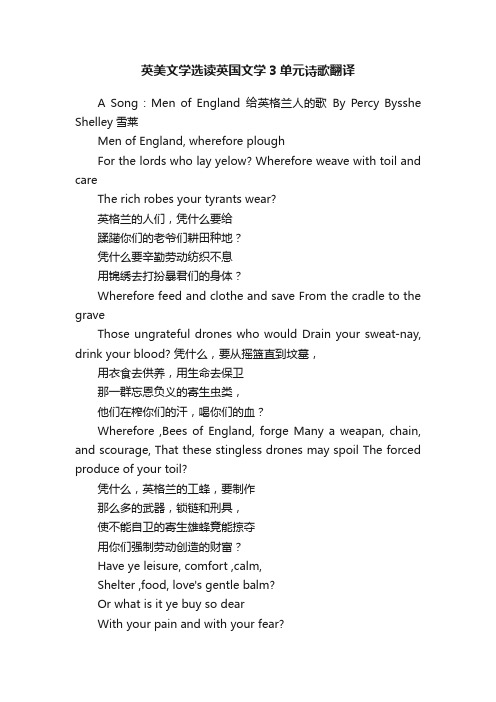
英美文学选读英国文学3单元诗歌翻译A Song : Men of England给英格兰人的歌By Percy Bysshe Shelley雪莱Men of England, wherefore ploughFor the lords who lay yelow? Wherefore weave with toil and careThe rich robes your tyrants wear?英格兰的人们,凭什么要给蹂躏你们的老爷们耕田种地?凭什么要辛勤劳动纺织不息用锦绣去打扮暴君们的身体?Wherefore feed and clothe and save From the cradle to the graveThose ungrateful drones who would Drain your sweat-nay, drink your blood? 凭什么,要从摇篮直到坟墓,用衣食去供养,用生命去保卫那一群忘恩负义的寄生虫类,他们在榨你们的汗,喝你们的血?Wherefore ,Bees of England, forge Many a weapan, chain, and scourage, That these stingless drones may spoil The forced produce of your toil?凭什么,英格兰的工蜂,要制作那么多的武器,锁链和刑具,使不能自卫的寄生雄蜂竟能掠夺用你们强制劳动创造的财富?Have ye leisure, comfort ,calm,Shelter ,food, love's gentle balm?Or what is it ye buy so dearWith your pain and with your fear?你们是有了舒适,安宁和闲暇,还是有了粮食,家园和爱的慰抚?否则,付出了这样昂贵的代价,担惊受怕忍痛吃苦又换来了什么?The seed ye sow, another reaps;The wealth ye find, another keeps;The robes ye weave, another wears;The arms ye forge, another bears.你们播下了种子,别人来收割;你们找到了财富,归别人占有;你们织布成衣,穿在别人身上;你们锻造武器,握在别人的手。
英国文学选读几篇背诵文章的英汉对照
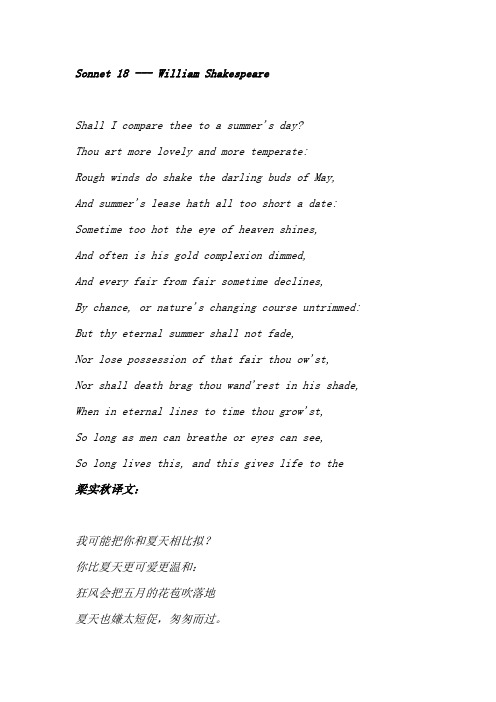
Sonnet 18 --- William ShakespeareShall I compare thee to a summer's day?Thou art more lovely and more temperate:Rough winds do shake the darling buds of May, And summer's lease hath all too short a date: Sometime too hot the eye of heaven shines,And often is his gold complexion dimmed,And every fair from fair sometime declines,By chance, or nature's changing course untrimmed: But thy eternal summer shall not fade,Nor lose possession of that fair thou ow'st,Nor shall death brag thou wand'rest in his shade, When in eternal lines to time thou grow'st,So long as men can breathe or eyes can see,So long lives this, and this gives life to the梁实秋译文:我可能把你和夏天相比拟?你比夏天更可爱更温和:狂风会把五月的花苞吹落地夏天也嫌太短促,匆匆而过。
有时太阳照得太热,常常又遮暗他的金色的脸;美的事物总不免要凋落,偶然的,或是随自然变化而流转。
但是你的永恒之夏不会褪色,你不会失去你的俊美的仪容;死神不能夸说你在它的阴影里面走着,如果你在这不朽的诗句里获得了永生;只要人们能呼吸,眼睛能看东西,此诗就会不朽,使你永久生存下去。
新编英国文学选读(上册)翻译
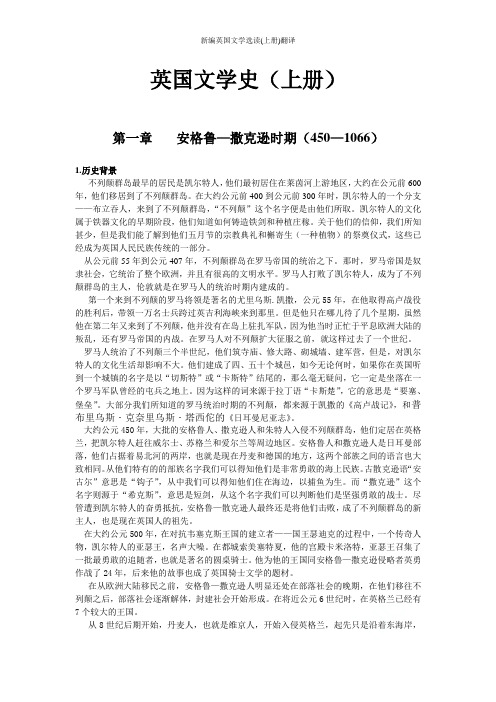
英国文学史(上册)第一章安格鲁—撒克逊时期(450—1066)1.历史背景不列颠群岛最早的居民是凯尔特人,他们最初居住在莱茵河上游地区,大约在公元前600年,他们移居到了不列颠群岛。
在大约公元前400到公元前300年时,凯尔特人的一个分支——布立吞人,来到了不列颠群岛,“不列颠”这个名字便是由他们所取。
凯尔特人的文化属于铁器文化的早期阶段,他们知道如何铸造铁剑和种植庄稼。
关于他们的信仰,我们所知甚少,但是我们能了解到他们五月节的宗教典礼和槲寄生(一种植物)的祭奠仪式,这些已经成为英国人民民族传统的一部分。
从公元前55年到公元407年,不列颠群岛在罗马帝国的统治之下。
那时,罗马帝国是奴隶社会,它统治了整个欧洲,并且有很高的文明水平。
罗马人打败了凯尔特人,成为了不列颠群岛的主人,伦敦就是在罗马人的统治时期内建成的。
第一个来到不列颠的罗马将领是著名的尤里乌斯.凯撒,公元55年,在他取得高卢战役的胜利后,带领一万名士兵跨过英吉利海峡来到那里。
但是他只在哪儿待了几个星期,虽然他在第二年又来到了不列颠,他并没有在岛上驻扎军队,因为他当时正忙于平息欧洲大陆的叛乱,还有罗马帝国的内战。
在罗马人对不列颠扩大征服之前,就这样过去了一个世纪。
罗马人统治了不列颠三个半世纪,他们筑寺庙、修大路、砌城墙、建军营,但是,对凯尔特人的文化生活却影响不大。
他们建成了四、五十个城邑,如今无论何时,如果你在英国听到一个城镇的名字是以“切斯特”或“卡斯特”结尾的,那么毫无疑问,它一定是坐落在一个罗马军队曾经的屯兵之地上。
因为这样的词来源于拉丁语“卡斯楚”,它的意思是“要塞、堡垒”。
大部分我们所知道的罗马统治时期的不列颠,都来源于凯撒的《高卢战记》,和普布里乌斯・克奈里乌斯・塔西佗的《日耳曼尼亚志》。
大约公元450年,大批的安格鲁人、撒克逊人和朱特人入侵不列颠群岛,他们定居在英格兰,把凯尔特人赶往威尔士、苏格兰和爱尔兰等周边地区。
安格鲁人和撒克逊人是日耳曼部落,他们占据着易北河的两岸,也就是现在丹麦和德国的地方,这两个部族之间的语言也大致相同。
莎翁优美英文诗歌带翻译

莎翁优美英文诗歌带翻译莎士比亚十四行诗结构技巧和语言技巧都很高,每首诗都有独立的审美价值,让人沉醉于优美的文字当中。
下面是店铺为大家带来莎翁优美英文诗歌带翻译,欢迎大家阅读欣赏!莎翁优美英文诗歌1As fast as thou shalt wane, so fast thou grow'st你衰败得快,但你将同样迅捷In one of thine, from that which thou departest;在你出生的孩子身上生长;And that fresh blood which youngly thou bestow'st你趁年轻时灌注的新鲜血液,Thou mayst call thine, when thou from youth convertest.依然是属于你的,不怕你衰亡。
Herein lives wisdom, beauty, and increase;这里存在着智慧,美,繁滋;Without this, folly, age, and cold decay.否则是愚笨,衰老,寒冷的腐朽:If all were minded so, the times should cease,如果大家不这样,时代会停止,And threescore year would make the world away.把世界结束也只消六十个年头。
Let those whom Nature hath not made for store,有些东西,造化不准备保留,Harsh, featureless, and rude, barrenly perish.尽可以丑陋粗糙,没果实就死掉:Look whom she best endowed, she gave the more;谁得天独厚,她让你更胜一筹;Which bounteous gift thou shouldst in bounty cherish.你就该抚育那恩赐,把它保存好;She carved thee for her seal, and meant thereby造化刻你做她的图章,只希望Thou shouldst print more, not let that copy die.你多留印鉴,也不让原印消亡。
(完整word版)扬州大学2016年英国文学简史考点
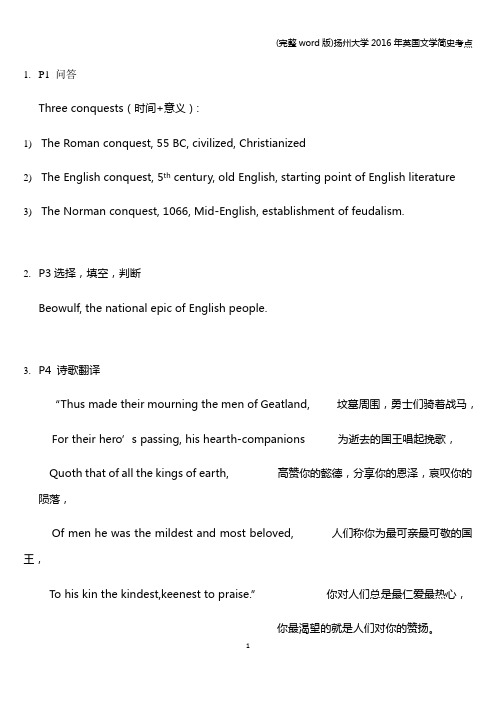
1.P1 问答Three conquests(时间+意义):1)The Roman conquest, 55 BC, civilized, Christianized2)The English conquest, 5th century, old English, starting point of English literature3)The Norman conquest, 1066, Mid-English, establishment of feudalism.2.P3选择,填空,判断Beowulf, the national epic of English people.3.P4 诗歌翻译“Thus made their mourning the men of Geatland, 坟墓周围,勇士们骑着战马,For their hero’s passing, his hearth-companions 为逝去的国王唱起挽歌,Quoth that of all the kings of earth, 高赞你的懿德,分享你的恩泽,哀叹你的陨落,Of men he was the mildest and most beloved, 人们称你为最可亲最可敬的国王,To his kin the kindest,keenest to praise.” 你对人们总是最仁爱最热心,你最渴望的就是人们对你的赞扬。
4.P5 名词解释,问答Features of Beowulf:1)The use of alliteration. (头韵)(定义:in alliterative verse, certain accented words in a line begin with the same consonant sound.)2)The use of metaphors and of understatements(隐喻)(Grendel represents forest, she-monster represents water, fire-dragon represents sky)5.P8 选择填空判断英国Romance代表作: adventures of King Arthur and his Knights of the Round Table (《亚瑟王和他的圆桌骑士》,同时也是骑士文学代表作)6.P9 问答The class nature of the romance:1)The theme of loyalty to king and lord was repeatedly emphasized in romances, asloyalty was the corner-stone of feudal morality, without which the wholestructure of feudalism would collapse.2)They were composed for the noble, of the noble, and in most cases by the poetspatronized by the noble.7.P17 选择填空名词解释The Ballads(民谣): the most important department of English folk literature.1)定义:①A ballad is a story told in song, usually in four-line stanzas, with the secondand forth lines rhymed. ②They are mainly the literature of peasants, and in them one is able to understand the outlook of the English common people in feudal society.2)代表作:The Robin Hood Ballads (罗宾汉民谣)8.P19 选择填空判断1)Geoffrey Chaucer, the founder of English poetry, was born about 1340 in London.2)The Canterbury Tales(坎特伯雷故事集) is Chaucer’s masterpiece and one of themonumental works in English literature.9.P25 问答Chaucer’s language and contribution:1)Chaucer’s language, now called Middle English, is vivid and exact. He is masterof word-pictures.2)He introduced from France the rhymed stanza of various types, especially therhymed couplet of 5 accents in iambic meter (the heroic couplet) to English poetry, instead of the old Anglo-Saxon alliterative verse.3)Chaucer did much in making the dialect of London standard for the modernEnglish speech.10.P27 问答Preparation for the English Renaissance:1)The establishment of the new monarchy2)Religious Reformation: the appearance of Protestantism3)Language and cultural preparation: the publish of English Bible11.P28 名词解释选择判断King James Bible: the authorized version of English Bible, which was made in 1611 under the auspices of James.12.P30-31名词解释问答(文艺复兴:全答;人文主义:第三点)1)Renaissance 定义:The rise of the bourgeoisie soon showed its influence in thesphere of cultural life. The result is an intellectual movement known as the Renaissance, or, the rebirth of letters. It sprang first in Italy in the 14th century and gradually spread all over Europe.2)Features of Renaissance:①The one is the thirsting curiosity for the classical literature.②The Renaissance is the keen interests in the activities of humanity.3)Humanism 定义:Humanism is the keynote of the Renaissance. It reflected the newoutlook of the rising bourgeois class, which saw the world opening before it.According to the humanists, both men and the world are hindered only by external checks from infinite improvement. Man could mould the world according to his desires, and attain happiness by removing all external checks by the exercise of reason.13.P40-42 选择判断填空1)Edmund Spenser代表作:The Faerie Queene《仙后》2)The Spenserian Stanza(斯宾塞体)定义:The Faerie Queene is written in a special verseform that consists of eight iambic pentameter lines followed by a ninth line of sixiambic feet, with the rhyme scheme ababbcbcc. This form has since been called the Spenserian Stanza.14.P43 诗歌翻译A gentle Knight was pricking(=spurring) on the plaine, 一位高贵的骑士正策马穿过平原,Y-cladd(=clad) in mightie armes and silver shielde, 他全副武装,手持银盾,Wherein old dints of deepe wounds did remain, 盾上仍留着陈旧的深深的凹痕,The cruell markes of many a bloody fielde; 这残酷的标记来自多次血腥的战阵;Yet armes till that time did he never wield: 但这些武器至今他还未用过;His angry steede did chide his foming(=foaming) bitt, 他那愤怒的坐骑暴躁地咬着马勒,As much disdayning to the curbe to yield: 似乎桀骜不驯,不愿受主人的控制;Full jolly Knight he seemed , and faire did sitt, 他看上去是位真正的骑士,端坐马上,As one for knightly giusts and fierce en counters fitt. 好像准备参加骑士比武,迎接激烈对抗。
莎士比亚经典英语诗歌译文
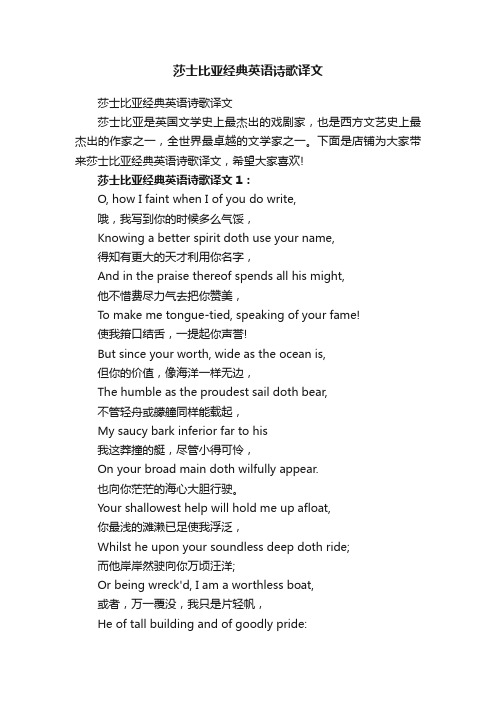
莎士比亚经典英语诗歌译文莎士比亚经典英语诗歌译文莎士比亚是英国文学史上最杰出的戏剧家,也是西方文艺史上最杰出的作家之一,全世界最卓越的文学家之一。
下面是店铺为大家带来莎士比亚经典英语诗歌译文,希望大家喜欢!莎士比亚经典英语诗歌译文1:O, how I faint when I of you do write,哦,我写到你的时候多么气馁,Knowing a better spirit doth use your name,得知有更大的天才利用你名字,And in the praise thereof spends all his might,他不惜费尽力气去把你赞美,To make me tongue-tied, speaking of your fame!使我箝口结舌,一提起你声誉!But since your worth, wide as the ocean is,但你的价值,像海洋一样无边,The humble as the proudest sail doth bear,不管轻舟或艨艟同样能载起,My saucy bark inferior far to his我这莽撞的艇,尽管小得可怜,On your broad main doth wilfully appear.也向你茫茫的海心大胆行驶。
Your shallowest help will hold me up afloat,你最浅的滩濑已足使我浮泛,Whilst he upon your soundless deep doth ride;而他岸岸然驶向你万顷汪洋;Or being wreck'd, I am a worthless boat,或者,万一覆没,我只是片轻帆,He of tall building and of goodly pride:他却是结构雄伟,气宇轩昂:Then if he thrive and I be cast away,如果他安全到达,而我遭失败,The worst was this; my love was my decay. 最不幸的是:毁我的是我的爱。
英国文学史 期末考试诗歌部分解释完整版
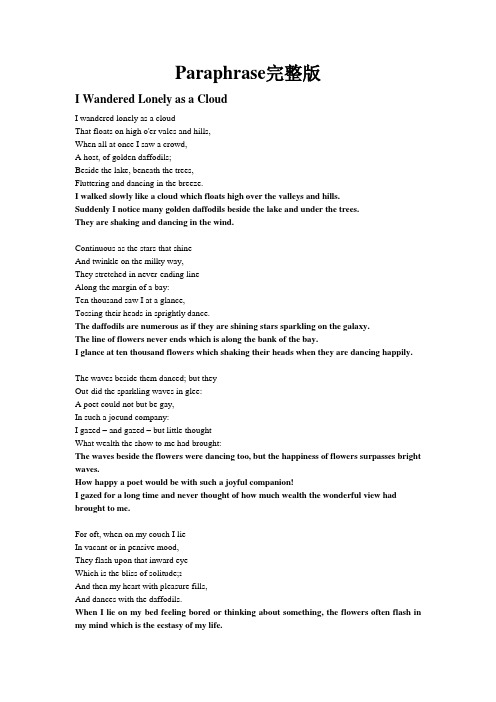
Paraphrase完整版I Wandered Lonely as a CloudI wandered lonely as a cloudThat floats on high o'er vales and hills,When all at once I saw a crowd,A host, of golden daffodils;Beside the lake, beneath the trees,Fluttering and dancing in the breeze.I walked slowly like a cloud which floats high over the valleys and hills.Suddenly I notice many golden daffodils beside the lake and under the trees.They are shaking and dancing in the wind.Continuous as the stars that shineAnd twinkle on the milky way,They stretched in never-ending lineAlong the margin of a bay:Ten thousand saw I at a glance,Tossing their heads in sprightly dance.The daffodils are numerous as if they are shining stars sparkling on the galaxy.The line of flowers never ends which is along the bank of the bay.I glance at ten thousand flowers which shaking their heads when they are dancing happily.The waves beside them danced; but theyOut-did the sparkling waves in glee:A poet could not but be gay,In such a jocund company:I gazed – and gazed – but little thoughtWhat wealth the show to me had brought:The waves beside the flowers were dancing too, but the happiness of flowers surpasses bright waves.How happy a poet would be with such a joyful companion!I gazed for a long time and never thought of how much wealth the wonderful view had brought to me.For oft, when on my couch I lieIn vacant or in pensive mood,They flash upon that inward eyeWhich is the bliss of solitude;2And then my heart with pleasure fills,And dances with the daffodils.When I lie on my bed feeling bored or thinking about something, the flowers often flash in my mind which is the ecstasy of my life.Then my heart is filled with pleasure and dances with the daffodils.Paradise LostOF Mans First Disobedience, and the FruitOf that Forbidden Tree, whose mortal tastBrought Death into the World, and all our woe,With loss of Eden, till one greater ManRestore us, and regain the blissful Seat,Man’s first sin that he tasted the forbidden fruit, caused death and troubles, and lost the paradise until the Messiah came and save us and regain the happy paradise.Ode to the West Wind51. Scarce seem'd a vision; I would ne'er have striven52. As thus with thee in prayer in my sore need.That is not a dream.I would never have pleaded with you urgently.65. And, by the incantation of this verse,66. Scatter, as from an unextinguish'd hearth67. Ashes and sparks, my words among mankind!68. Be through my lips to unawaken'd earth69. The trumpet of a prophecy!With the help of magic verse, my words were scattered among mankind through my mouth to the sleeping earth, like the ashes and sparks from the burning stove.Let the predictions be scattered!O Wind,Oh, Wind,70. If Winter comes, can Spring be far behind?If Winter comes, can Spring be far behind?The FleaMark but this flea, and mark in this,How little that which thou deniest me is;Me it sucked first, and now sucks thee,And in this flea our two bloods mingled be;Thou know'st that this cannot be saidA sin, or shame, or loss of maidenhead,Yet this enjoys before it woo,And pampered swells with one blood made of two,And this, alas, is more than we would do.Oh stay, three lives in one flea spare,Where we almost, nay more than married are.This flea is you and I, and thisOur marriage bed and marriage temple is;Though parents grudge, and you, we are met,And cloisered in these living walls of jet.Though use make you apt to kill meLet not to that, self-murder added be,And sacrilege, three sins in killing three.Cruel and sudden, hast thou sincePurpled thy nail in blood of innocence?Wherein could this flea guilty be,Except in that drop which it sucked from thee?Yet thou triumph'st, and say'st that thouFind'st not thy self nor me the weaker now;'Tis true; then learn how false fears be: and then you know, indeed there was no need to fear for it.Just so much honor, when thou yield'st to me,Will waste, as this flea's death look life from thee.Romeo and JulietSelected R from Romeo and Juliet (ACT II SCENE II)Capulet's orchard.[Enter ROMEO.]ROMEO He jests at scars that never felt a wound.He (Mercutio), who never felt a wound, makes fun of my scars.[JULIET appears above at a window.2]But, soft! what light through yonder window breaks?But, hush! What light break through the window over there?It is the east, and Juliet is the sun.Arise, fair sun, and kill the envious moon3, 5Who is already sick and pale with grief,That thou her maid art far more fair than she:You, the moon’s maid, are much more beautiful than she is,Be not her maid, since she is envious;Her vestal livery is but sick and green1You are not her maid, since she is envious. The uniform ("livery") worn by virgins("vestal") in the service of Diana is sick and green.And none but fools do wear it; cast it off. 2 10It is my lady, O, it is my love!O, that she knew she were!I wish that she knew she were my lover!She speaks yet she says nothing: what of that?Her eye discourses3; I will answer it.She speaks, yet her lips are not moving; what of that? Her eyes speak, and I willanswer them.I am too bold, 'tis not to me she speaks: 15I am too reckless. She doesn’t speak to me.Two of the fairest stars in all the heaven,Having some business, do entreat her eyesTo twinkle in their spheres till they return.4Two of the most brilliant stars in the sky who have to leave their orbits, ask Juliet’seyes to twinkle in their place until they return.What if her eyes were there, they in her head?What if her eyes were in the sky and the stars become her eyes in her head?The brightness of her cheek would shame those stars, 20As daylight doth a lamp; her eyes in heavenWould through the airy region stream so brightThat birds would sing and think it were not night.5See, how she leans her cheek upon her hand!O, that I were a glove upon that hand, 25That I might touch that cheek!The brightness of her cheek would shame the stars in the sky, as daylight does to alamp. Her eyes in the sky would flow through the airy sky so brightly that birdswould sing and think it were not at night. Look, how she leans her cheek upon herhand! Oh, I wish I were a glove on her hands so that I could touch her cheek!JULIET Ay me! 1ROMEO She speaks:O, speak again, bright angel! for thou artAs glorious to this night, being o'er my head 30As is a winged messenger of heavenUnto the white-upturned wondering eyesOf mortals that fall back to gaze on himWhen he bestrides the lazy-pacing cloudsAnd sails upon the bosom of the air. 35She speaks. Oh, speak again, bright angel! Because you are as glorious to the nightover my head. You are as if a messenger from heaven with wings and I was one ofthe mortals look up to you with wondering eyes and bestriding the slowly walkingclouds, sailing through the sky.JULIET O Romeo, Romeo! wherefore art thou Romeo?2Deny thy father and refuse thy name;Or, if thou wilt not, be but sworn my love,And I'll no longer be a Capulet.Oh, Romeo, Romeo! Why are you Romeo? Deny your father and change your name.Or if you will not, just promise me your love to me and I’ll no longer be a Capulet. ROMEO [Aside] Shall I hear more, or shall I speak at this?Can I hear more or can I speak?JULIET 'Tis but thy name that is my enemy3; 40Thou art thyself, though not a Montague.But only your name is my enemy. You would be yourself even if you had some other name.What's Montague? it is nor hand, nor foot,Nor arm, nor face, nor any other partBelonging to a man. O, be some other name!Oh, change your name!What's in a name? that which we call a rose 45By any other name would smell as sweet;What’s the inner meaning of a name? What we call a rose would smell fragrant byany other name.So Romeo would, were he not Romeo call'd,Retain that dear perfection which he owes4So if Romeo is not called Romeo, he will still keep his precious perfection he own.Without that title. Romeo, doff thy name1,And for that name which is no part of thee 50Take all myself.Without your title, Romeo, discard your name, and take all myself to replace thatname which is no longer a part of you.第二部分OMEO[To JULIET]If I profane with my unworthiest hand This holy shrine,the gentle fine is this:My lips,two blushing pilgrims,ready stand To smooth that rough touch with atender kiss.JULIETGood pilgrim,you do wrong your hand too much,Which mannerly devotion shows inthis;For saints have hands that pilgrims' hands do touch,And palm to palm is holypalmers' kiss.ROMEOHave not saints lips,and holy palmers too?JULIETAy,pilgrim,lips that they must use in prayer.ROMEOO,then,dear saint,let!lips do what hands do;They pray,grant thou,lest faith turn to despair.JULIETSaints do not move,though grant for prayers' sake.ROMEOThen move not,while my prayer's effect I take.Thus from my lips,by yours,my sin is purged.JULIETThen have my lips the sin that they have took.ROMEOSin from thylips?O trespasssweetly urged!Give me my sin again.JULIETYou kiss by the book.HAMLET独白部分To be, or not to be: that is the question:Should I live on or should I kill myself? That is a question.Whether 'tis nobler in the mind to suffer 65Whether it is determined to sufferThe slings and arrows of outrageous fortune,The fatal attacks of cruel destiny,Or to take arms against a sea of troubles,Or to fight against numerous troubles.And by opposing end them? To die: to sleep;No more; and by a sleep to say we endThe heart-ache and the thousand natural shocks 70And make them end by defiance. To die is no more than to sleep; and we no longer sufferfrom the aching of heart and many natural attacks the body is suffering.That flesh is heir to, 'tis a consummationDevoutly to be wish'd. To die, to sleep;It is a result we eagerly wish. To die is to sleep.To sleep: perchance to dream: ay, there's the rub;We may dream when sleeping. Ah, this is the dilemma.For in that sleep of death what dreams may comeBecause when we died what dreams may we have?When we have shuffled off this mortal coil, 75When we have got rid of the turmoil of mortality,Must give us pause8: there’s the respectThe sleeping-like death must bring about our hesitation. There exists the consideration That makes calamity of so long life;That makes the disorder/disaster long live.For who would bear the whips and scorns of time11,For who have to endure the punishment and insult in this world,The oppressor's wrong, the proud man's contumely12,The oppressor’s evil and the proud man’s scornful insolence,The pangs of dispised love, the law's delay, 80The pain of rejected love and the justice of law coming late.The insolence of office and the spurns13That patient merit of the unworthy takes14,The insolence of the power and the contemptuous rejections, which the people of praiseworthy take of the unworthy.When he himself might his quietus make15With a bare bodkin16? who would fardels17 bear,To grunt18 and sweat under a weary life, 85If he himself might make an end of his life/might free himself from all troubles of life with a mere dagger? Who would shoulder the burdens to groan and sweat in a boring and tiring life?But that the dread of something after death,If not for the fear of the things after death,The undiscover'd country19 from whose bourn20,No traveller returns, puzzles the will21The unknown place where we go after death, no traveler returns from the boundary of which after death, confuses the will,And makes us rather bear those ills we haveMakes us prefer to stand the evilThan fly to others that we know not of? 90Than to fly to other places we don’t know?Thus conscience1 does make cowards of us all; 2Thus the consciousness makes all of us dastardsAnd thus the native hue of resolution3And the natural color of determination,Is sicklied o'er4 with the pale cast of thought5,Is made sick with the pale look of thought,And enterprises of great pith and moment6And the plans of great height and importance,With this regard their currents turn awry7, 95Because their direction turn aside,And lose the name of action8.--Soft you now!9And lose the honor that derives from action,--- Restrain yourself!。
英美文学选读诗歌翻译

SONNET 18 (William Shakespeare)十四行诗Shall I compare thee to a summer's day?Thou art more lovely and more temperate: Rough winds do shake the darling buds of May, And summer's lease hath all too short a date: Sometime too hot the eye of heaven shines,A nd often is his gold complexion dimm’d,And every fair from fair sometime declines,By chance, or nature's changing course untrimm’d: But thy eternal summer shall not fadeNor lose possession of that fair thou ow’st,Nor shall Death brag thou wander’st in his shade, When in eternal lines to time thou grow’st.So long as men can breathe or eyes can see,So long lives this, and this gives life to thee.我怎么能够将你比作夏天?你比夏天更美丽温婉。
狂风将五月的蓓蕾凋残,夏日的勾留何其短暂。
休恋那烈日当空,转眼会云雾迷蒙;休叹那百花凋零,摧折于无常天命;唯有你永恒的夏日长新,你的美貌亦毫发无损。
死神也无缘将你幽禁,你在我永恒的诗中长存。
只要世间尚有人吟诵我的诗篇,这诗就将不朽,永葆你的芳颜。
Structure: Runs in iambic pentameter, rhymed ABAB CDCD EFEF GG.1. What is the theme of this sonnet? Eternality, beauty, immorality2. Why is the speaker’s beloved more lovely than a summer’s day?One thing he is thinking of is how short lived summer is. Another reason he says his love is more beautiful than a summer day is that the summer whether can be harsh, making nature look less beautiful than it does otherwise. 3.There is obviously a shift of tone and subject matter in line 9. Describe such a shift.The author compared the loved one, just in a soft and sentimental tone similar to many love sonnets, to a summer’s day in the first 4 lines, while, in the following 4, developing this concept to the p oor power of people falling to retain the fair against Nature. But in line 9, the author reversed it in a more emotional and definite tone to express the eternal youth of the loved ones.I Hear America Singing (Walt Whitman) 我听见美国在歌唱(沃尔特·惠特曼)I hear America singing, the varied carols I hear.Those of mechanics, each one singing his as it should be blithe and strong,The carpenter singing his as he measures his plank or beam,The mason singing his as he makes ready for work,or leaves off work,The boatman singing what belongs to him in his boat, the deckhand singing on the steamboat deck,The shoemaker singing as he sits on his bench, the hatter singing as he stands,The wood-cutter's song, the ploughboy's on his way in the morning, or at noon intermission or at sundown,The delicious singing of the mother, or of the young wife at work, or of the girl sewing or washing,Each singing what belongs to him or her and to none else,The day what belongs to the day--at night the party of young fellows, robust, friendly,Singing with open mouths their strong melodious songs.我听见美国在歌唱,我听见各种不同的颂歌机器匠在歌唱着,他们每人歌唱着他的愉快而强健的歌,木匠在歌唱着,一边比量着他的木板或梁木,泥瓦匠在歌唱着,当他准备工作或停止工作的时候,船家歌唱着他船里所有的一切,水手在汽艇的甲板上歌唱着,鞋匠坐在他的工作凳上歌唱,帽匠歌唱着,站在那里工作,伐木者、犁田青年们歌唱着,当他们每天早晨走在路上,或者午间歇息,或到了日落的时候,我更听到母亲的美妙的歌,正在操作的年轻的妻子们的或缝衣或洗衣的女孩子们的歌,每人歌唱属于他或她而不是属于任何别人的一切,白昼歌唱白昼所有的,晚间,强壮而友爱的青年们的集会,张嘴唱着他们的强健而和谐的歌。
英国文学选读课文翻译
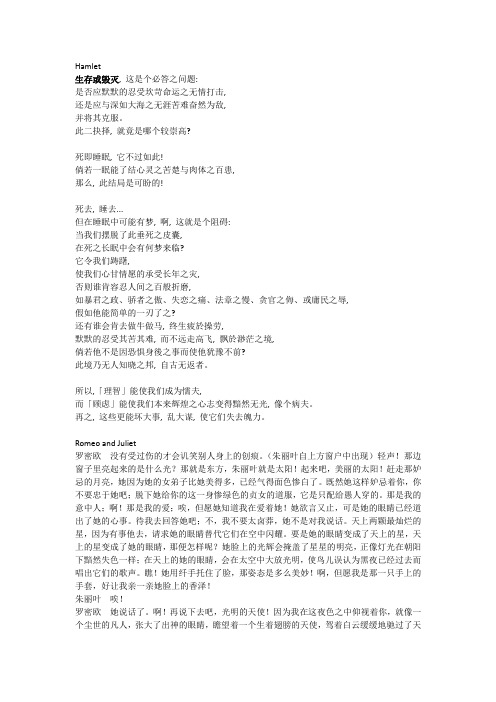
Hamlet生存或毁灭, 这是个必答之问题:是否应默默的忍受坎苛命运之无情打击,还是应与深如大海之无涯苦难奋然为敌,并将其克服。
此二抉择, 就竟是哪个较崇高?死即睡眠, 它不过如此!倘若一眠能了结心灵之苦楚与肉体之百患,那么, 此结局是可盼的!死去, 睡去...但在睡眠中可能有梦, 啊, 这就是个阻碍:当我们摆脱了此垂死之皮囊,在死之长眠中会有何梦来临?它令我们踌躇,使我们心甘情愿的承受长年之灾,否则谁肯容忍人间之百般折磨,如暴君之政、骄者之傲、失恋之痛、法章之慢、贪官之侮、或庸民之辱,假如他能简单的一刃了之?还有谁会肯去做牛做马, 终生疲於操劳,默默的忍受其苦其难, 而不远走高飞, 飘於渺茫之境,倘若他不是因恐惧身後之事而使他犹豫不前?此境乃无人知晓之邦, 自古无返者。
所以,「理智」能使我们成为懦夫,而「顾虑」能使我们本来辉煌之心志变得黯然无光, 像个病夫。
再之, 这些更能坏大事, 乱大谋, 使它们失去魄力。
Romeo and Juliet罗密欧没有受过伤的才会讥笑别人身上的创痕。
(朱丽叶自上方窗户中出现)轻声!那边窗子里亮起来的是什么光?那就是东方,朱丽叶就是太阳!起来吧,美丽的太阳!赶走那妒忌的月亮,她因为她的女弟子比她美得多,已经气得面色惨白了。
既然她这样妒忌着你,你不要忠于她吧;脱下她给你的这一身惨绿色的贞女的道服,它是只配给愚人穿的。
那是我的意中人;啊!那是我的爱;唉,但愿她知道我在爱着她!她欲言又止,可是她的眼睛已经道出了她的心事。
待我去回答她吧;不,我不要太卤莽,她不是对我说话。
天上两颗最灿烂的星,因为有事他去,请求她的眼睛替代它们在空中闪耀。
要是她的眼睛变成了天上的星,天上的星变成了她的眼睛,那便怎样呢?她脸上的光辉会掩盖了星星的明亮,正像灯光在朝阳下黯然失色一样;在天上的她的眼睛,会在太空中大放光明,使鸟儿误认为黑夜已经过去而唱出它们的歌声。
瞧!她用纤手托住了脸,那姿态是多么美妙!啊,但愿我是那一只手上的手套,好让我亲一亲她脸上的香泽!朱丽叶唉!罗密欧她说话了。
英国文学史诗歌分析

1. Sonnet 18----William Shakespeare Shall I compare thee to a summer's day?(Could I compare you to the time of summer?)Thou art more lovely and more temperate:(You are more lovely and more gentle and mild than the days)(Rough winds do shake the darling buds of May,(The wild winds shakes the favorite flowers of May. )And summer's lease hath all too short a date:(And the duration of summer has a limited period of time)Sometime too hot the eye of heaven shines,(Sometimes the sun shining is too hot. )And often is his gold complexion dimmed;(Or often goes behind the clouds.)And every fair from fair sometime declines,(And everything beautiful will lose its beauty.)By chance or nature's changing course untrimmed;(By misfortune or by nature’s planned out course)But thy eternal summer shall not fade ,(But your youth shall not fade)Nor lose possession of that fair thou ow’st;(Nor will you lose the beauty that you possessed)Nor shall Death brag thou wander'rest in his shade,(Nor will death claim you for his own)When in eternal lines to time thou grow’st(Because in my eternal verse you will live forever)So long as men can breathe or eyes can see,(So long as the men can live in the world with sight and breath)So long lives this, and this gives life to thee.(This poem will exist and you will live in forever.)a)The author of the poem is William Shakespeare .It is a typical English sonnet, the rhymescheme of the poem is “abab cdcd efef gg”.b)On the surface the poem is simply a statement to praise the beauty of the young man. But themore important is the poet wants to show the power of the poem which can defy time and last forever. The stability of love and its power to immortalize the subject of the poet's verse is the theme.2. On His Blindness----John MiltonWhen I consider how my light is spent 想到了在这茫茫黑暗的世界里Ere half my days, in this dark world and wide还未到半生这两眼就已失明,And that one talent which is death to hide ,想到了我的才能,要是埋起来,Lodged with me useless, though my soul more bent 会招致死亡,却放在我手里无用,To serve therewith my Maker, and present 虽然我一心想用它服务造物主,My true account, lest He, returning chide;免得报账时,得不到他的宽容;"Doth God exact day-labor, light denied?" "神不给我光明,还让我做日工 ?’’想到这,I fondly ask. But Patience, to prevent 我愚蠢地自问.但"忍耐"看我在抱怨,That murmur, soon replies, "God doth not need" 立刻止住我,神并不要你工作,Either man's work or his own gifts.;Who best 或还他礼物。
莎士比亚经典英文诗歌带翻译
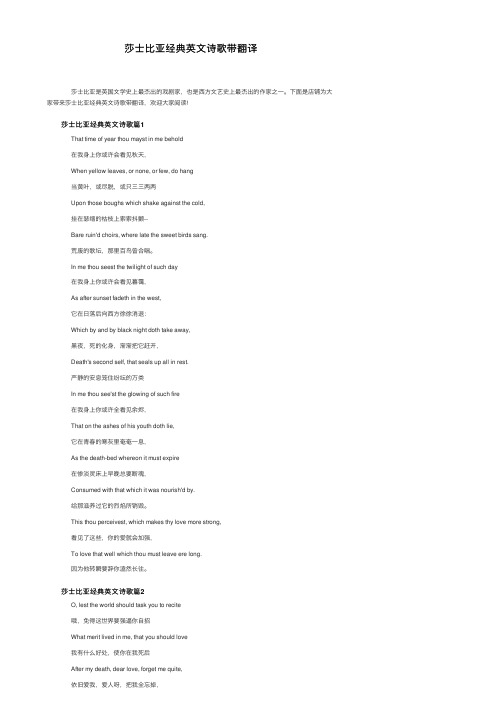
莎⼠⽐亚经典英⽂诗歌带翻译 莎⼠⽐亚是英国⽂学史上最杰出的戏剧家,也是西⽅⽂艺史上最杰出的作家之⼀。
下⾯是店铺为⼤家带来莎⼠⽐亚经典英⽂诗歌带翻译,欢迎⼤家阅读! 莎⼠⽐亚经典英⽂诗歌篇1 That time of year thou mayst in me behold 在我⾝上你或许会看见秋天, When yellow leaves, or none, or few, do hang 当黄叶,或尽脱,或只三三两两 Upon those boughs which shake against the cold, 挂在瑟缩的枯枝上索索抖颤-- Bare ruin'd choirs, where late the sweet birds sang. 荒废的歌坛,那⾥百鸟曾合唱。
In me thou seest the twilight of such day 在我⾝上你或许会看见暮霭, As after sunset fadeth in the west, 它在⽇落后向西⽅徐徐消退: Which by and by black night doth take away, ⿊夜,死的化⾝,渐渐把它赶开, Death's second self, that seals up all in rest. 严静的安息笼住纷纭的万类 In me thou see'st the glowing of such fire 在我⾝上你或许全看见余烬, That on the ashes of his youth doth lie, 它在青春的寒灰⾥奄奄⼀息, As the death-bed whereon it must expire 在惨淡灵床上早晚总要断魂, Consumed with that which it was nourish'd by. 给那滋养过它的烈焰所销毁。
This thou perceivest, which makes thy love more strong, 看见了这些,你的爱就会加强, To love that well which thou must leave ere long. 因为他转瞬要辞你溘然长往。
- 1、下载文档前请自行甄别文档内容的完整性,平台不提供额外的编辑、内容补充、找答案等附加服务。
- 2、"仅部分预览"的文档,不可在线预览部分如存在完整性等问题,可反馈申请退款(可完整预览的文档不适用该条件!)。
- 3、如文档侵犯您的权益,请联系客服反馈,我们会尽快为您处理(人工客服工作时间:9:00-18:30)。
文学史诗歌翻译P118 To His Coy Mistress《致娇羞女友》原文:Had we but world enough, and time, This coyness, lady, were no crime.We would sit down and think which way To walk, and pass our long love’s day;But at my back I always hearTime’s winged chariot hurrying near; And yonder all before us lieDeserts of vast eternity.Thy beauty shall no more be found, Nor, in thy marble vault, shall sound My echoing song; then worms shall try That long preserv’d virginity,And your quaint honour turn to dust, And into ashes all my lust.中译:如果我们的世界够大,时间够多,小姐,这样的羞怯就算不上罪过。
我们会坐下来,想想该上哪边去散步,度过我们漫漫的爱情天。
可是我背后总听到声音:时间的飞轮急促的逼近;而摆在我们前头的一切就是永恒的无边荒野。
你的美决不会重新找到,你的大理石坟窖里也短少我的歌声;蛆虫会成阵来品尝那一瓶久藏的童贞,你的矫情化成了尘土我的欲情白白的烧枯。
P204 A Red, Red Rose《一朵红红的玫瑰》原文:O my Luve's like a red, red rose That’s newly sprung in June;O my Luve's like the melodie That’s sweetly play'd in tune.As fair art thou, my bonnie lass, So deep in luve am I:And I will luve thee still, my dear, Till a’ the seas gang dry:Till a’ the seas gang dry, my dear, And the rocks melt wi’ the sun:I will luve thee still, my dear, While the sands o’ life shall run.And fare thee well, my only Luve And fare thee well, a while!And I will come again, my Luve, Tho’ it were ten thousand mile.中译:啊,我的爱人像朵红红的玫瑰,六月里迎风除开;啊,我的爱人像支甜甜的曲子,奏的合拍又和谐。
我的好姑娘,你有多么美,我的情也有多深。
我将永远爱你,亲爱的,直到大海干枯水流尽。
直到大海干枯水流尽,太阳把岩石烧作灰尘,我也永远爱你,亲爱的,只要我一息犹存。
珍重吧,我唯一的爱人,珍重吧让我们暂时别离,我准定回来,亲爱的,哪怕跋涉千万里!P205 Bruce at Bannockburn《苏格兰人》原文:Scots, wha hae wi' Wallace bled, Scots, wham Bruce has after led Welcome to your gorybedOr to vicorie!Now's the day, and now's the hour: See the front o' battle lour,See approach proud Edward's power --- Chains and slaverie!Wha will be a traitor knave?Wha can fill a coward's grave?Wha sae base as be a slave?Let him turn,and flee!Wha for Scotland's King and Law Freedom's sword will strongly draw, Freeman stand, or Freeman fa',Let him follow me!By Oppression's woes and pains,By your sons in servile chains,We will drain our dearest veins,But they shall be free!Lay the proud usurpers low!Tyrants fall in every foe!Liberty's in every blow!---Let us do --- or dee!中译:跟华莱士流过血的苏格兰人,随布鲁斯作过战的苏格兰人,起来!倒在血泊里也成——要不就夺取胜利!时刻已到,决战已近,前线的军情吃紧,骄横的爱德华在统兵入侵——带来锁链,带来奴役!谁愿卖国求荣?谁愿爬进懦夫的坟茔?谁卑鄙到宁做奴隶偷生?——让他走,让他逃避!谁愿将苏格兰国王和法律保护,拔出自由之剑来痛击,猛舞?谁愿生作自由人,死作自由魂?-让他来,跟我出击!凭被压迫者的苦难来起誓,凭你们受奴役的子孙来起誓,我们决心流血到死-但他们必须自由!打倒骄横的簒位者!多一次攻击,添一分自由!死一个敌人,少一个暴君!动手-要不就断头!P208 Auld Lang Syne 《往昔的时光》原文:Should auld acquaintance be forgot,And never brought to min’?Should auld acquaintance be forgot,And days o’ auld lang syne? (Chorus) For auld lang syne, my dear,For auld lang syne.We'll tak a cup o' kindness yet,For auld lang syne!We twa ha’e run about the braes,And pu'd the gowans fine;But we've wandered mony a weary foot, Sin' auld lang syne.We twa hae paidl'd in the burn,Frae mornin’ sun till dine;But seas between us braid hae roared Sin' auld lang syne. 中译:老朋友哪能遗忘,哪能不放在心上?老朋友哪能遗忘,还有往昔的时光?为了往昔的时光,老朋友,为了往昔的时光,再干一杯友情的酒,为了往昔的时光,我们曾邀游山岗,到处将野花拜访。
但以后走上疲惫的旅程,逝去了往昔的时光!我们曾赤脚瞠过河流,水声笑语里将时间忘。
如今大海的怒涛把我们隔开,逝去了往昔的时光!P216"SHE DWELT AMONG THE UNTRODDEN WAYS"原文:SHE dwelt among the untrodden ways Beside the springs of Dove,A Maid whom there were none to praise And very few to love:A violet by a mossy stoneHalf hidden from the eye!--Fair as a star, when only oneIs shining in the sky.She lived unknown, and few could know When Lucy ceased to be;But she is in her grave, and, oh,The difference to me! 中译:她居住在白鸽泉水的旁边,无人来往的路径通往四面;一位姑娘不曾受人称赞,也不曾受过别人的爱怜。
苔藓石旁的一株紫罗兰,半藏着没有被人看见!美丽得如同天上的星点,一颗唯一的星清辉闪闪。
她生无人知,死也无人唁,不知何时去了人间;但她安睡在墓中,哦可怜,对于我呵是个地异天变!P241 Ode to the West Wind《西风颂》原文:Oh, lift me as a wave, a leaf, a cloud!I fall upon the thorns of life! I bleed!A heavy weight of hours has chained and bowedOne too like thee: tameless, and swift, and proud.Make me thy lyre, even as the forest is:What if my leavers are falling like its own! The tumult of thy mighty harmoniesWill take from both a deep, autumnal tone, Sweet though in sadness. Be thou, Spirit fierce,My spirit! Be thou me, impetuous one!Drive my dead thoughts over the universe Like withered leaves to quicken a new birth! And, by the incantation of this verse,Scatter, is from an unextinguished hearth Ashes and sparks, my words among mankind! Be through my lips to unawakened earthThe trumpet of a prophecy! O, Wind,If winter comes, can Spring be far behind? 中译:啊,西风!将我带走吧!就像你唤起了浪花,卷走了枯叶,云彩!我已身陷在生活的荆棘丛里,血流汩汩!沉重的时代羁绊和压抑着我一个跟你一样桀骜不驯,迅猛自负的人。
